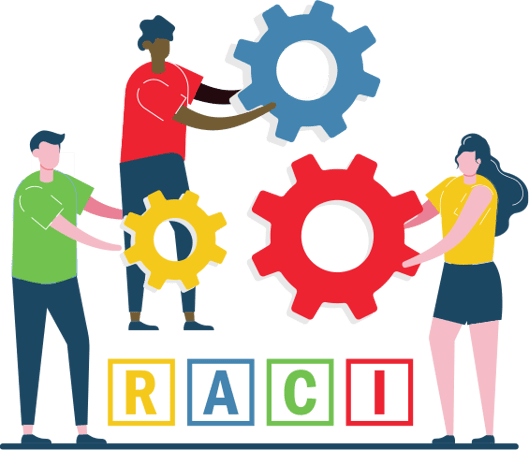By Cassie Solomon, RACI Solutions
A few years into my consulting career, I stumbled on an ancient Harvard Business Review article called “Who’s Got the Monkey” by William Oncken, Jr and Donald L. Wass.[1] Originally published in 1974 (and oh boy it shows) it eventually became a book called “The One Minute Manager Meets the Monkey” by Ken Blanchard in 1999. (Still dated.)
In spite of the fact that these two resources read as incredibly old-fashioned – let’s retire the monkey metaphor okay? – both are still filled with true gems about holding people accountable. My goal is to bring forward some of these gems, updated for the modern workplace. One upgrade is calling these “gremlins” instead of “monkeys”.
A gremlin is defined as the “next move” on any project you are involved in. Who takes the multiple “gremlins” after a conversation or a team meeting? Who is taking the next action step? If you are taking too many gremlins yourself, you may feel exhausted and overwhelmed, or you may feel resentful. This is similar to asking “Who is taking the R’s out of this conversation or meeting?”
For example, last week I was talking with the co-founder of a volunteer group we lead together explaining that I didn’t have time to organize the next meeting. He agreed to take the R. At the end of our conversation, he casually asked if I could send him the contact names of everyone in the group. (He’s been meeting with this group for years.). Voila, the “gremlin” or next step just jumped onto my back, in spite of my attempts to wiggle free.
One of the gems from this original article is the delineation of Five Levels of Initiative:
The Five Levels of Initiative
Level 1: Wait until told what to do.
Level 2: Ask what to do.
Level 3: Recommend an action, then with your manager’s approval, implement it.
Level 4: Take independent action but advise at once.
Level 5: Take independent action and update you through routine procedure.
HAVE A CONVERSATION ABOUT INITIATIVE
Like RACI, this framework gives you a neutral language to discuss the “soft skills” of delegation and accountability. The article goes on to advise you to outlaw the use of 1 and 2. When an employee brings you a problem, require that they bring it along with their recommendation (Level 3). This can sometimes take the form of volunteering to be helpful. “Would it help if I (took the next step)?" This is more initiative than waiting silently to be told what to do. This framework gives you a way to have a conversation about your expectations that doesn’t feel personal.
Even if you reject their suggestion, everyone involved will learn something and the suggestions will get better over time. Without taking this risk, by remaining passive, the system can’t learn and evolve. The article also recommends that you specify what level of initiative you want them to use when they move forward to solve the problem. This is very similar to using the RACI shorthand language to help people understand what decisions you are empowering. Do you want them to take the next steps, the “R”? Do you want them to orchestrate the work of several people, the R-Prime? Do you want them to make the decision, the A?
ARE YOU OVER-FUNCTIONING?
You cannot decide if you are over-functioning without beginning to notice if the people around you are under-functioning.
- Overfunctioning: taking on more responsibility than is necessary or appropriate (a good article here on overfunctioning).
- Underfunctioning: a state where an individual doesn’t adequately fulfill responsibilities or roles, often relying on others for support or decision-making.
The “gremlin” is less likely to jump from your employee’s or your colleague’s shoulder to your shoulder if you start to pay attention to “who has the gremlin?” In my experience, when someone presents an issue passively (level 1 or level 2) that makes it more likely that I will step in with the solution – and often I will end up taking the next steps, too.
What if someone takes the gremlin and runs off with it, assuming more authority than you intended for them to have? We’ll cover that in our Empowerment blog series. For the first blog in this series, click here, "Ready or Not, RACI and Empowerment”.
At RACI Solutions, we spend a lot of time thinking about how people:
- Take up their roles
- Understand the limits of their authority
- Contribute with authority
- Hold others accountable
Schedule a free 30-minute strategy session today to discuss how RACI can be helpful for you and your team.
[1] Oncken, William Jr., and Donald L. Wass. "Management Time: Who's Got the Monkey?" Harvard Business Review, November-December 1999. https://hbr.org/1999/11/management-time-whos-got-the-monkey.



